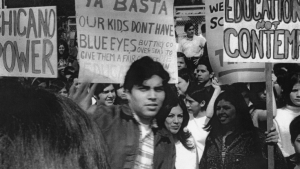Winner of the Fall 2016 StMU History Media Award for
Best Multimedia Presentation
This video with Robert Tijerina is the first in our series of videos on American History. In this first video, Robert explores the relationship between the Founding Fathers and their views on slavery.


47 comments
Seth Roen
What a different way to use the website, I also did not know how many Founding Fathers were an abolitionist despite being a slave owner. Instead of writing a traditional article on the subject, I like how you decide to make a video on the Founding Fathers and slavery. Also, I like how you made the video rather entertaining and informative throughout the entire video.
Amelie Rivas-Berlanga
Firstly, congratulations on winning the “Best Multimedia Production” award! This video was so informational and funny. Having the mix of the two keeps the audience engaged. I like how you took a controversial topic and made it interesting. Explaining how each of them contributed to the abolishment of slavery was a good approach. The video was a great idea, I feel like it makes the concepts stick better.
Kensley Dieckow
I loved your video! I liked that you went back and forth between factual content and witty jokes, it really kept me engaged. This really reminds me of John greens crash course and I can imagine that you took inspiration from it, and you did it very well. Congratulations on your award it was well deserved. Most people forget that those who wrote the constitution were only writing it for a certain group of Americans.
Christopher Metta Bexar
Roberto’s video on slavery made me feel like other current events of this last decade…self-serving people trying to make themselves feel good by defaming the reputations of historical figures who cannot defend themselves.
Most of the information in the video is not new, nor is it unbiased, two things which good historical reporting should be. It is one thing to say the Japanese had “comfort women” during the Second World War. It is another to defame people from this nation or another when they nor their friends and family are around to defend them.
Mariah Podwika
I really liked this video! It was a very creative and entertaining take on teaching about how the Founding Fathers dealt with the issue of slavery. It’s hard to say if the Founding Fathers made the right choice to wait for abolishing slavery. I would compare it to approaching a feral cat in an alley: you don’t want to approach it so fast or blindside it so that you scare it; you have to approach it in a way that won’t make it attack. One line of reasoning for them waiting was that it was, unfortunately, the norm for people to own slaves, and they knew that people wouldn’t react well to an outward attack on it. But, they all seemed to know that slavery was morally wrong. They knew this and advocated for abolition behind the scenes, but when it came to their presidencies or times that they actually could have backed up their words, they flopped. It’s unfortunate that there was such a long period of lying in wait for change for people of color just because it was too much of a risk to ruffle the feathers of the slave owners.
Sabrina Drouin
Congrats on your best multimedia award, this video definitely deserved it and it was a great break from reading. I also really enjoyed your topic and explanation of each founding father’s stance on slavery and how many slaves they owned. Overall, I think that if they could’ve most of them would’ve abolished slavery, but since some states weren’t even willing to take a glance at the Constitution if they abolished slavery, I think they tried their best to one day, hopefully have slavery abolished.
Caily Torres
People of color were viewed as inferior when compared to non-colored people, their rights were stripped from them and they were forced into slavery. I believe that it wasn’t morally right for the founding fathers to not abolish slavery in the constitution. Although this belied and practice may have been passed down through generations, over time, they began to see that it wasn’t morally right. It can be hard to try to enforce change when so many still advocated for such a practice, however, this is not an excuse to not push for the basic human rights of all people no matter the color of their skin.
Angela Calderon
It’s difficult to discern whether or not the founding fathers were in the right over not abolishing slavery in the Constitution. On one hand, it was simply socially acceptable at the time, and most did not know better than to continue in the beliefs and institutions passed onto them. Such a drastic shift from “normalcy” was controversial, and the founding fathers needed to be strategic about their instilling of a new Constitution. It needed to be widely accepted. On the other hand, morally, slavery wasn’t good. A lot of the founding fathers knew this and even advocated for abolition, yet never followed through, especially during their respective presidencies. It’s really sad to think about when African Americans were pivotal to the winning of the Revolutionary War, and aided the United States through joining battalions, espionage, etc.
Hali Garcia
I really love this video! It was put together, easy to watch, and informative with a little bit of humor. I did notice that abolishing slavery was not mentioned when the constitution was being written. I think I only heard that Washington had slaves about a year ago and that kind of took be by surprise but then again it did not. I found out that Alexander Hamilton wanted to abolish slavery through the musical. I love how you looked into the founding fathers and broke down their views individually. Good job on this video and congratulations for your award, you deserve it!
Raymond Munoz
Watching this video was a fresh change of pace from reading so many articles. Personally, this was really good and great way to learn, but I don’t think this is something I could do, just because I’m not great at video editing. The quality of the video really showed the time, effort, and skill of the presenter. I hope to see more presentations like this!